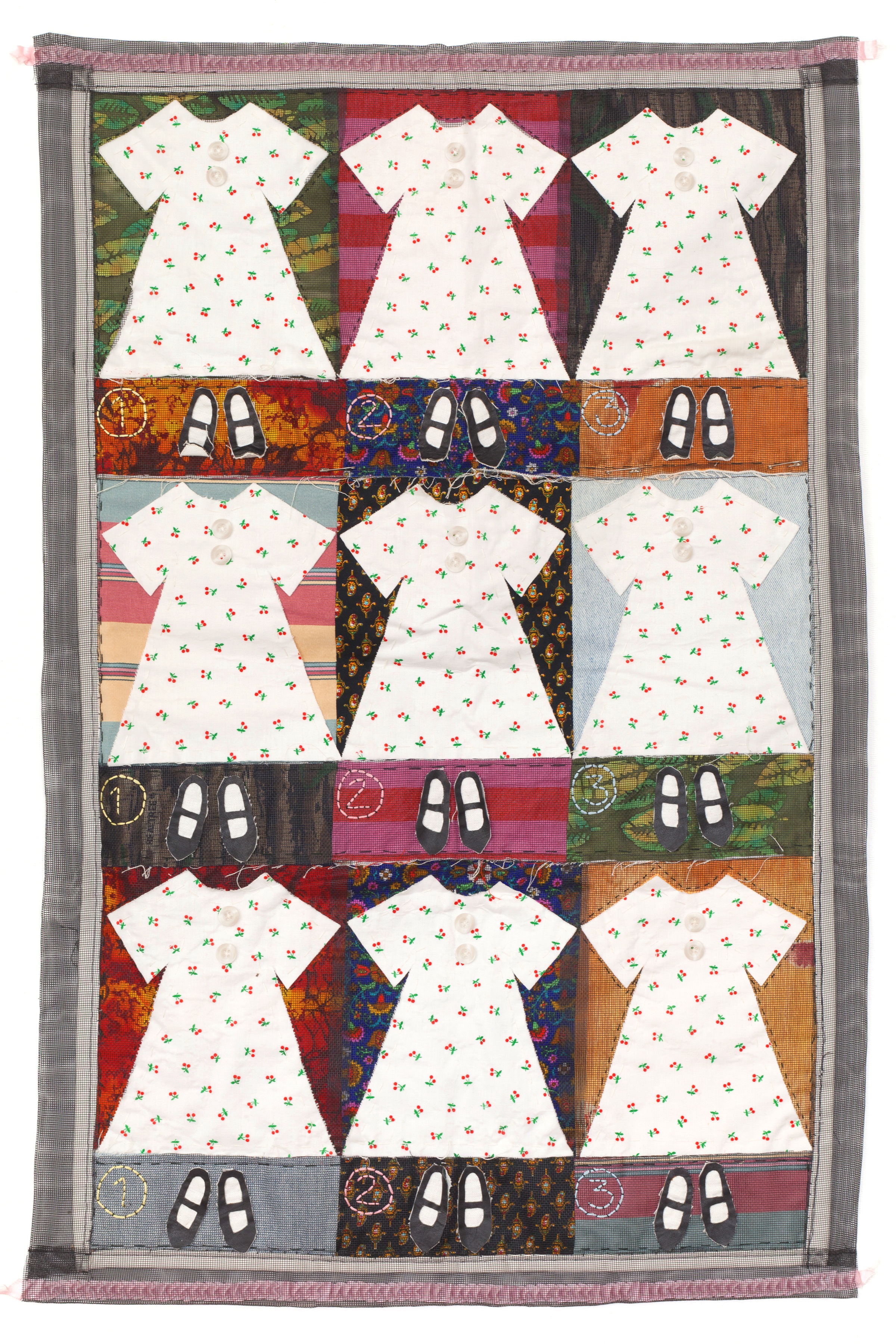The Stitcher
Fiona Lovell Horning, Girlie Quilt, Printed fabrics, vinyl screen, ribbon, sewn
She sits on the brick steps of the house. Head bent, she carefully gathers the pale blue cotton into folds and pinches it tightly between the fingers of her left hand. Though she is left handed, she has trained herself to use her right. Thimble on her middle finger, she carefully draws the needle through to make a neat stitch. She repeats the process again and again until the smocked pattern begins to take shape. It will become the yoke of the dress she is making for the youngest of her three daughters. She makes almost all of their clothes. Carefully cutting the pattern pieces she manages to make three of a kind. One slightly smaller than the next, they are embroidered or otherwise embellished.
Her daughters have less than two years between each of them. The eldest being only seven. Marrying late in life she has hurried to create them. Looking out upon them now she is still surprised to have made three new human beings. A decade before, when all the women she knew were marrying and bearing children, she, herself saw none of this in her future.
For many years she had kept house for her long-widowed father in the house she grew up in. A semi-detached house in a London suburb; a shelter in the garden left over from the war. When her mother had died at thirty-five she was left behind with four siblings. She was their care-giver but it did not prevent two of them dying by the time she was thirty.
By day she was a teacher. In the evenings, she usually shared a meal with her father, went for a walk and read. It was comfortable if not remarkable.
Then one summer evening she is invited to tea at the house of an old friend. Her friend is married and her husband has brought home a colleague from work. The colleague is younger than herself, not handsome but interesting, a little shy and clearly intrigued by her. A few days later they will have a meal together and six weeks later they will be engaged. He will leave her then for the United States. A job. An opportunity. Nine months later she joins him and they are married in the state of Pennsylvania.
Now, it is early summer and still cool at this time of the morning. But later, when the sun reaches its height, she will be uncomfortably hot. Then she will go inside to stay cool in the cellar where she has a sewing machine and a room where she does crafts.
She has painted a hopscotch board on the floor and pink polka dots on the walls to entertain the girls.
It is years since her immigration and yet she refrains from her adopted country. She continues her habit of a late afternoon cup of tea. She waits for the brown paper parcels to arrive from home wrapped around biscuits, tea, and household items from Marks & Spencer’s. Although she doesn’t complain of her homesickness, she eagerly awaits each tissue-thin air-letter from her sister. Phoning is expensive and reserved only for bad news such as the death of her father two years before. They do not own a television. She does not drive.
The girls, fair skinned and freckled, play in the garden. Their voices burble out toward her and she is glad they still have the sweet accent of her homeland. Mostly, they are well behaved, she thinks. She has made each of them a pinafore which they wear over their dresses when playing to keep their clothes clean. The children from the neighborhood, whom she finds unpleasant, do not come over out of curiosity to play anymore. Instead, the girls press flowers in books, draw, read, and play games of pretend. She has crafted them a life. It is clean. They are not hungry. They are safe. And, they have each other, she thinks, and that is enough.
Fiona Lovell Horning, Fiber work in progress


